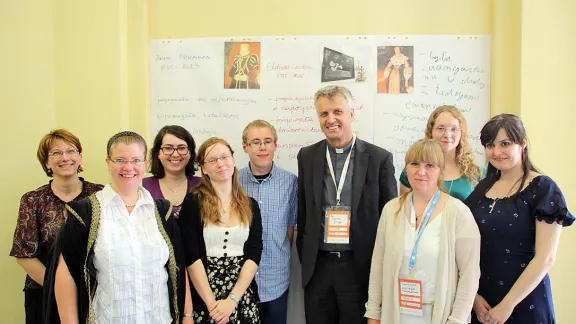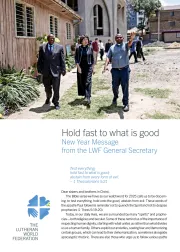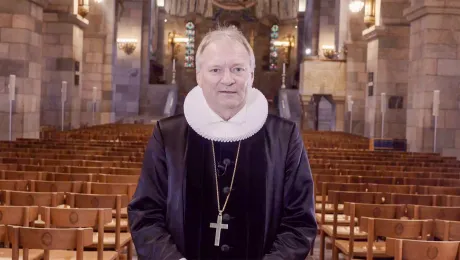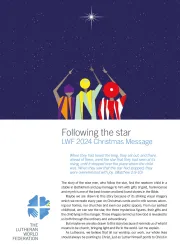
Over 5,000 people from 12 countries attended the 9th Days of Encounter for Christians from Central and Eastern Europe in Wroclaw from 4 to 6 July. Photo: LWF/Florian Hübner
“Free in Christ” 25 Years after the Fall of the Iron Curtain
WROCLAW, Poland/GENEVA, 11 July 2014 (LWI) – The Lutheran World Federation (LWF) General Secretary Rev. Martin Junge called for responsible use of freedom during a worship service in Wroclaw, which concluded a gathering of Christians from 12 countries in Central and Eastern Europe.
Preaching in the Mary Magdalene Cathedral on 6 July, Junge urged the congregation not to fear the challenges that come with freedom, 25 years after the fall of the Iron Curtain. “It is time to hold on to freedom and to continue to move forward, not backward,” he stated.
The general secretary said in his view, it was the abuse of freedom, and not freedom itself that is responsible for difficult social situations such as mass unemployment among young people, conflicts among nations or the threat to creation. From a Christian perspective, freedom only finds its true nature “when it is linked to the ministry of love for our fellow human beings,” Junge underlined.
“Free in Christ”
Over 5,000 people from 12 countries attended the 9th Days of Encounter for Christians from Central and Eastern Europe, 4-6 June in Wroclaw. The theme “Free in Christ (Gal 5:1)” was developed against the background of changes in the region since the fall of communism. The Days of Encounter are intended to enable an “exchange of opinion among different local traditions,” explained Bishop Ryszard Bogusz from the host church, the Evangelical Church of the Augsburg Confession in Poland, during the opening service.
Featuring discussion, singing and prayer, the encounters took place in numerous workshops, interactive programs and youth concerts. There was a spirit of mutual understanding that crossed language barriers in and around the Wroclaw Centennial Hall. Activities included concerts, a sports program for teenagers and a market of opportunities for the many visitors. Participants came from neighboring countries and from further afield. The Polish church was particularly pleased to welcome so many ecumenical participants, representatives of foreign diplomatic missions and guests of honor.
Bible Studies, Lectures, Discussions
The second day began with Bible studies on the theme of the Days of Encounter. Saxony’s Lutheran Bishop Jochen Bohl took the opportunity to criticize the pressure to perform that sometimes accompanies freedom. “Instead of accepting the gift of God’s salvation, people make huge efforts to earn it,” Bohl asserted. However, he said that freedom is also a gift of God and must be “lived out with responsibility.”
A highpoint of the meeting was the keynote presentation by Jerzy Buzek, former Polish Prime Minister and former President of the European Parliament. He underlined the historical achievement of the churches during the political transformation in Eastern Europe. “Our continent was torn apart and civil society was without any institutional backbone. Often the only institutional support was given by the church.”
European integration is a unique process bringing peace, freedom and prosperity, he said, underlining that the churches played an important role at the time providing a moral compass, and they still do. For Buzek, the current European crisis is not just an economic crisis, but also a crisis of values. “Freedom without moral rules can be harmful,” Buzek declared and pointed to situations in which the prosperity of a few has excluded others from general well-being in society.
Women of the Reformation and Today
The program of the encounter days was deliberately varied and lively. In one discussion forum on the topic of “Women of the Reformation,” participants in historical dress portrayed women from the Reformation period presenting their extraordinary achievements.
The LWF general secretary, who attended the session, emphasized the significance of women in the Reformation period with the message: “In 2017 we do not just want to concern ourselves with his-story of the Reformation but also with her-story. Thank you for presenting her-stories today.” A similar comment came from Agnieszka Godfrejow-Tarnogorska, coordinator of the LWF Women in Church and Society (WICAS) network for the region. She underlined that in a church where the Reformation was ongoing, “the role of women […] is not just a question of the past but also of the present.”
Ecumenical Questions
Junge took part in a panel discussion on the ecumenical perspective of the 2017 Reformation anniversary. He said he did not agree with the attitude that the differences between the Lutheran and Roman Catholic Church were almost insurmountable: “The dialogue document From Conflict to Communion contains more topics that have been worked through than open questions,” Junge underlined. The two sides are continuing to work on the unresolved issues of ministry, the Eucharist and the understanding of the Church.
“We are concerned for unity. We must be concerned for unity,” he added, summing up the LWF’s ecumenical commitment.
During the 9th Days of Encounter, the LWF Vice-President for the region, Bishop Tamás Fabiny from Hungary, Junge and LWF Europe Secretary Rev. Dr Eva-Sibylle Vogel-Mfato, met with the LWF National Committee in Poland. They expressed appreciation for the committee’s work in interpreting and promoting LWF’s activities at the national level.
Hungary to Host 2016 Days of Encounter
On 6 July the Days of Encounter ended with a concluding service in Wroclaw as well as seven services conducted as the participants made their way home.
Churches from the region have been holding these days of encounter biannually and the number of countries and visitors has significantly increased in the last few years. The Evangelical Lutheran Church in Hungary has issued an invitation to the 10th Days of Encounter in Budapest in 2016.


